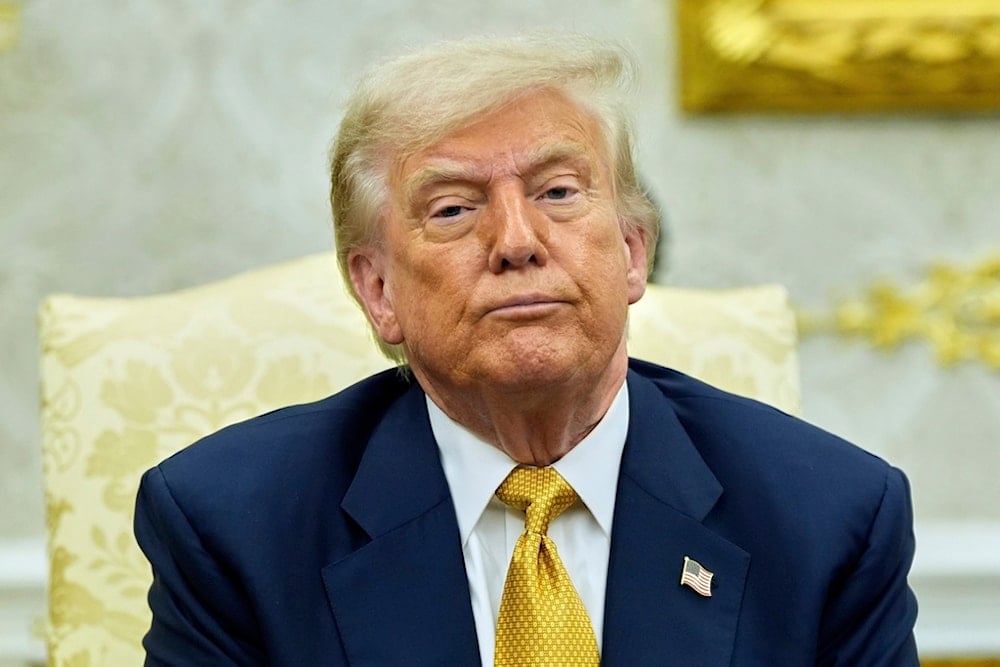Trump admin. to deny bond hearings for undocumented immigrants
The new Trump scheme risks mass detentions and sparks legal and human rights concerns.
-

President Donald Trump listens during a meeting with Bahrain's Crown Prince Salman bin Hamad Al Khalifa in the Oval Office of the White House, on Wednesday, July 16, 2025, in Washington (AP)
The Trump administration has initiated a sweeping new policy aimed at expanding the detention of undocumented immigrants by denying them access to bond hearings, according to an internal memo reviewed in part by Reuters. The change could potentially affect millions of individuals contesting their deportation and dramatically increase the number of people held in US immigration custody.
The memo, authored by acting Immigration and Customs Enforcement (ICE) Director Todd Lyons and dated July 8, instructs ICE to interpret existing immigration law provisions as categorical "prohibitions on release" after arrest. The guidance encourages ICE prosecutors to seek continued detention during immigration court proceedings and develop arguments to justify prolonged custody, even in cases previously eligible for bond.
Legal experts warn the shift upends decades of precedent. Tom Jawetz, a former Department of Homeland Security official under President Joe Biden, described the move as "a radical departure that could explode the detention population."
Legal pushback anticipated
While the guidance has not yet been formally challenged in court, the memo itself anticipates legal pushback, noting that the policy is "likely to be litigated." Immigration advocacy groups and civil rights organizations are expected to oppose the change on constitutional grounds.
The policy comes as President Donald Trump intensifies his hardline approach to immigration in his second term, vowing mass deportations to address what he describes as a crisis inherited from his Democratic predecessor. Under Trump’s renewed directives, ICE is expected to ramp up enforcement efforts across the country.
A recently passed congressional spending bill reflects this shift in tone, authorizing funding to detain at least 100,000 individuals, nearly doubling the record-high 58,000 held in federal immigration custody as of late June.
The Washington Post, which first reported on the ICE memo, highlighted growing concerns over the human and legal implications of detaining thousands of immigrants without due process.
Supreme Court lets Trump resume migrant deportations
The US Supreme Court has cleared the Trump administration to restart deporting migrants to third countries, including those with unstable conditions, such as South Sudan.
In a brief, unsigned order, the court's conservative majority paused a lower court ruling that had required the government to provide migrants a "meaningful opportunity" to contest their removal if they faced threats like torture or persecution. No explanation was given, but the decision allows deportations to continue while the appeal process unfolds. Liberal justices dissented strongly.
The ruling enables the administration to expedite deportations to countries that are not the migrants' original homelands. This includes individuals held at a US military base in Djibouti, some of whom the administration had previously tried to send to South Sudan.
The Department of Homeland Security welcomed the move, with Spokesperson Tricia McLaughlin stating, "DHS can now execute its lawful authority and remove illegal aliens to a country willing to accept them. Fire up the deportation planes."
Dissenters decry ruling that risks sending migrants into danger
Justice Sonia Sotomayor issued a sharp dissent, accusing the court of enabling due process violations. She argued the ruling disregards the risk of migrants facing severe harm in unfamiliar countries. “In matters of life and death, it is best to proceed with caution,” she wrote.
US District Judge Brian Murphy had previously ruled the administration violated court orders when it sought to deport eight men, convicted of serious crimes, to South Sudan, deemed unsafe by the US State Department. Only one of the men was actually South Sudanese.
Immigrant rights groups filed the case, arguing that the men faced removal to countries where they had no citizenship or ties. After South Sudan refused the group, the men were taken to Djibouti, where they remained in US custody. The individuals are originally from Cuba, Mexico, Laos, Vietnam, and Myanmar.
Reuters reported the administration had also considered Libya, despite longstanding US criticism of its detention conditions.

 4 Min Read
4 Min Read










